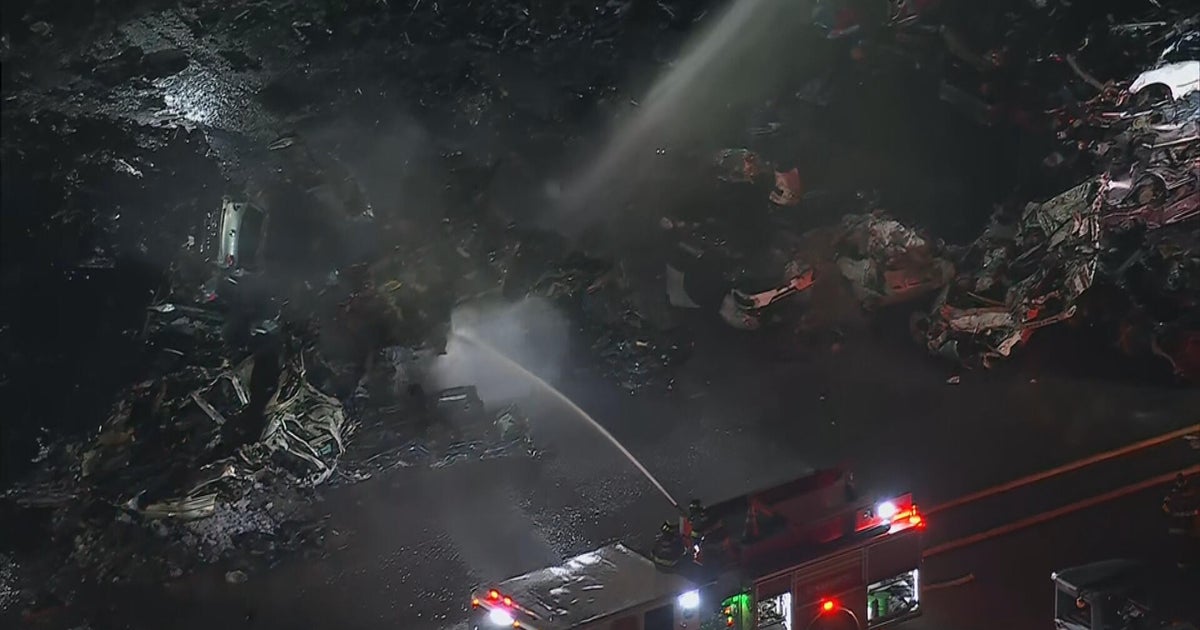Christie To Pull N.J. From Greenhouse Gas Initiative
TRENTON, N.J. (AP) -- New Jersey will withdraw from a 10-state regional greenhouse gas reduction program by the end of the year, Gov. Chris Christie announced Thursday, saying it hasn't worked to combat global warming.
The decision marks a turnaround for a highly industrialized state that was an early backer of reducing greenhouse gas pollution — credentials that helped promote the leader of its environmental efforts to head the federal Environmental Protection Agency.
"This program is not effective in reducing greenhouse gases and is unlikely to be in the future," said Christie, a Republican. "The whole system is not working as it was intended to work. It is a failure."
The EPA's leader, Lisa Jackson, urged Christie to reconsider, saying the program helps reduce air pollution, promotes clean energy and creates jobs.
Christie is the latest Republican to announce that his state would exit a regional pact to reduce the gases linked to global climate change. Similar agreements in the West and Midwest are struggling. Efforts by other Northeastern states to withdraw are stalled.
The Northeast pact — the Regional Greenhouse Gas Initiative, or RGGI — puts a price tag on pollution by requiring fossil fuel-burning power plants in the 10-state region to buy credits to cover the carbon they emit, a method known as cap-and-trade. The money from the sale of the credits is meant to be used to pay for renewable energy initiatives.
"RGGI does nothing more than tax electricity, tax our citizens, tax our businesses with no discernible or measurable impact upon our environment," Christie said, noting that other big Northeastern states, such as Pennsylvania, are not members.
Yet in 2008 when the program started, New Jersey's largest electric company, Public Service Enterprise Group, supported cap-and-trade, saying it allowed companies to use their ingenuity and knowledge of markets to achieve environmental goals.
Jeff Tittel, director of the New Jersey Sierra Club, said Thursday that the program was working as designed. He said New Jersey's greenhouse gas emissions from electric power plants had declined 10 percent since 2009. He said the pact was responsible for creating 18,000 jobs in the region and generating $2.3 billion in economic benefits.
The EPA also commended the program in response to Christie's decision.
"While we respect every governor's prerogative to make policy decisions, this is a disappointing step given New Jersey's legacy of leadership on environmental issues," said Brendan Gilfillan, spokesman for Jackson. "We hope the governor will reconsider."
Pacts in the West and Midwest have faltered in recent years as Republicans appointed to state office have postponed or delayed their states' participation. For instance, Arizona Gov. Jan Brewer signed an executive order 15 months ago to extract the state from its commitments.
Christie's announcement puts him in line with three Republicans running for president or considering doing so. Tim Pawlenty of Minnesota, Jon Huntsman of Utah and Mitt Romney of Massachusetts all supported regional emissions trading programs as governor, but none do now.
The announcement thrilled conservatives, who have been dogging governors in the Northeast to abandon the effort to limit greenhouse gas emissions by charging utilities for their fossil fuel output. But it angered lawmakers who supported New Jersey's participation since 2008 in RGGI.
"Today, I'm proud to say Christie is our governor," said conservative Steve Lonegan, head of the state's Americans for Prosperity chapter. AFP is backed by billionaire brothers David and Charles Koch of energy giant Koch Industries, which has been lobbying around the country for the repeal of the program.
Lonegan said he hoped New Jersey's pullout would signal the collapse of the entire program, but a state lawmaker who pushed for New Jersey's participation four years ago lamented Christie's announcement as a dismal day for the state's clean air and energy advocacy efforts.
"Sadly, this day will go down in history as the one in which New Jersey ceded its standing as a leader in environmental protection efforts," said Assemblyman John McKeon, a Democrat who chairs the Assembly environment committee.
Though Democrats control the Legislature, the majority party may be powerless to stop the Republican governor from carrying out the exit strategy because no legislation is required for him to do so.
Christie said he is committed to increasing off-shore wind production and making solar energy more affordable. Four nuclear power plants, including the country's oldest reactor, supply a portion of the most densely populated state's electricity needs.
Christie, who in November raised questions about the causes of global warming, said Thursday that he believes climate change is real and caused, at least partially, by human activity.
The waning support of states for action on global warming comes as federal efforts to combat climate change are taking hits from conservative Democrats and Republicans. President Barack Obama and Jackson, former head of the New Jersey Department of Environmental Protection, endorsed legislation that would have launched a national market for pollution permits to be bought and sold.
The bill failed to pass last Congress when Democrats were in charge. And with Republicans now controlling the House, Obama has said he would pursue other ways to fight global warming.
The agency and Jackson are now under attack from Republicans who say it is taking job-destroying steps to reduce global warming pollution.
Besides New Jersey, states participating in the pact are Connecticut, Delaware, Maine, Maryland, Massachusetts, New Hampshire, New York, Rhode Island and Vermont.
In Delaware, the Legislature recently considered a measure to withdraw from the program, but members refused to move the bill move out of the House Energy Committee.
Legislation is pending in New Hampshire that would make it easier for that state to leave the pact if another large New England state, such as Massachusetts or Connecticut, withdraws. However, Democratic Gov. John Lynch opposes repealing the law.
(Copyright 2011 by The Associated Press. All Rights Reserved.)







